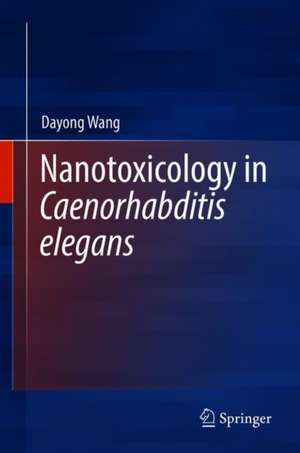Nanotoxicology in Caenorhabditis elegans
Autor Dayong Wangen Limba Engleză Hardback – 6 iun 2018
| Toate formatele și edițiile | Preț | Express |
|---|---|---|
| Paperback (1) | 1046.41 lei 38-44 zile | |
| Springer Nature Singapore – 11 feb 2019 | 1046.41 lei 38-44 zile | |
| Hardback (1) | 1168.86 lei 3-5 săpt. | |
| Springer Nature Singapore – 6 iun 2018 | 1168.86 lei 3-5 săpt. |
Preț: 1168.86 lei
Preț vechi: 1230.38 lei
-5% Nou
Puncte Express: 1753
Preț estimativ în valută:
223.73€ • 243.10$ • 188.06£
223.73€ • 243.10$ • 188.06£
Carte disponibilă
Livrare economică 31 martie-14 aprilie
Preluare comenzi: 021 569.72.76
Specificații
ISBN-13: 9789811302329
ISBN-10: 9811302324
Pagini: 368
Ilustrații: X, 274 p. 123 illus., 103 illus. in color.
Dimensiuni: 155 x 235 mm
Greutate: 0.7 kg
Ediția:1st ed. 2018
Editura: Springer Nature Singapore
Colecția Springer
Locul publicării:Singapore, Singapore
ISBN-10: 9811302324
Pagini: 368
Ilustrații: X, 274 p. 123 illus., 103 illus. in color.
Dimensiuni: 155 x 235 mm
Greutate: 0.7 kg
Ediția:1st ed. 2018
Editura: Springer Nature Singapore
Colecția Springer
Locul publicării:Singapore, Singapore
Cuprins
Values of C. elegans in Toxicological Study.- Endpoints for Toxicity Assessment of Nanomaterials.- Exposure Routes of Nanomaterials.- Toxic Effects of Certain Nanomaterials.- Physicochemical Basis for Nanotoxicity Formation.- Cellular and Physiological Mechanisms of Nanotoxicity Formation.- Molecular Mechanisms of Nanotoxicity Formation.- Distribution and Translocation of Nanomaterials.- Confirmation of Nanomaterials with Low-Toxicity or Non-Toxicity Property.- Surface Chemical Modification to Reduce the Toxicity of Nanomaterials.- Pharmacological Prevention of the Toxicity Induced by Environmental Nanomaterials
Notă biografică
Dr. Dayong Wang is a professor at the Medical School, Southeast University, China. He obtained his Ph.D. from Peking University in 2001 and completed his post-doctoral training at the University of Toronto from 2002 to 2004. His research focuses on toxicology and pathology using Caenorhabditis elegans as a model animal, fields in which he has published more than 160 research articles.
Textul de pe ultima copertă
This book focuses on the toxicity of engineered nanomaterials (ENMs) and their underlying physicochemical, cellular, physiological, and molecular mechanisms. Further, it covers ENMs’ translocation and their targeted organ toxicology, and discusses chemical and pharmacological strategies used to combat nanotoxicity. Engineered nanomaterials (ENMs) are defined as materials with one or more dimensions of less than 100 nm, and have shown considerable promise in several areas of development. At the same time, the potential toxicity of ENMs for human health and environmental organisms is increasingly attracting attention. In addition to the typical properties of model animals, Caenorhabditis elegans is extremely sensitive to environmental toxicants, which makes it the ideal in vivo assay system for toxicological studies. C. elegans has been widely used in toxicity assessment and toxicological studies of environmental toxicants and stresses. This book provides a comprehensive summary of nanotoxicology research on C. elegans.
Caracteristici
Focusing on the toxicity of engineered nanomaterials (ENMs) and their underlying physicochemical, cellular, physiological, and molecular mechanisms. Discussing chemical and pharmacological strategies used to combat nanotoxicity With ample color figures
